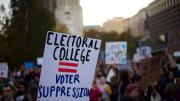1919 Alice Hamilton is appointed assistant professor of industrial medicine, becoming the first woman to hold a professorial position at the University.
1934 The mayor of Cambridge orders that fire trucks from the new station near Memorial Hall must not sound their sirens on Thursday nights (when concerts are in progress) until they are two blocks away from Sanders Theatre.
|
1944 Between matinees at the RKO Theatre in Boston, Duke Ellington visits Harvard to discuss "Negro Music in America" before a crowd in Paine Hall, and then treats the audience to a medley that includes "Don't Get Around Much Anymore" and "Mood Indigo."
1954 A Center for Middle Eastern Studies has been established at Harvard within the Faculty of Arts and Sciences, the third such "area program" in the University; the others focus on East Asia and the Soviet Union. Faculty members from the graduate schools of law, business, public health, and public administration are also involved in the project.
1969 Some 70 students occupy University Hall to protest ROTC and Harvard expansion, precipitating a police bust and student strike.
1974 A $200 increase in tuition and a $125 increase in room-and-board rates raise the cost of a Harvard-Radcliffe education to $5,350 the same price as Yale's.
1979 President Derek C. Bok issues two open letters to the Harvard community, on "the ethical responsibilities of the university in society" and on "divestment of stock," both concerning in large part Harvard's ownership of stock in companies doing business in apartheid South Africa. A Washington Post editorial suggests that Bok has "sharpened the issue at least to a point where the opponents can see each other."
1984 Computer-consciousness is on the rise throughout the University. The Business School has announced that incoming M.B.A. students will be required to use portable IBM personal computers as part of regular class preparation, and the Expository Writing program is offering an experimental section in which the papers are written and critiqued on computers on loan from IBM.





